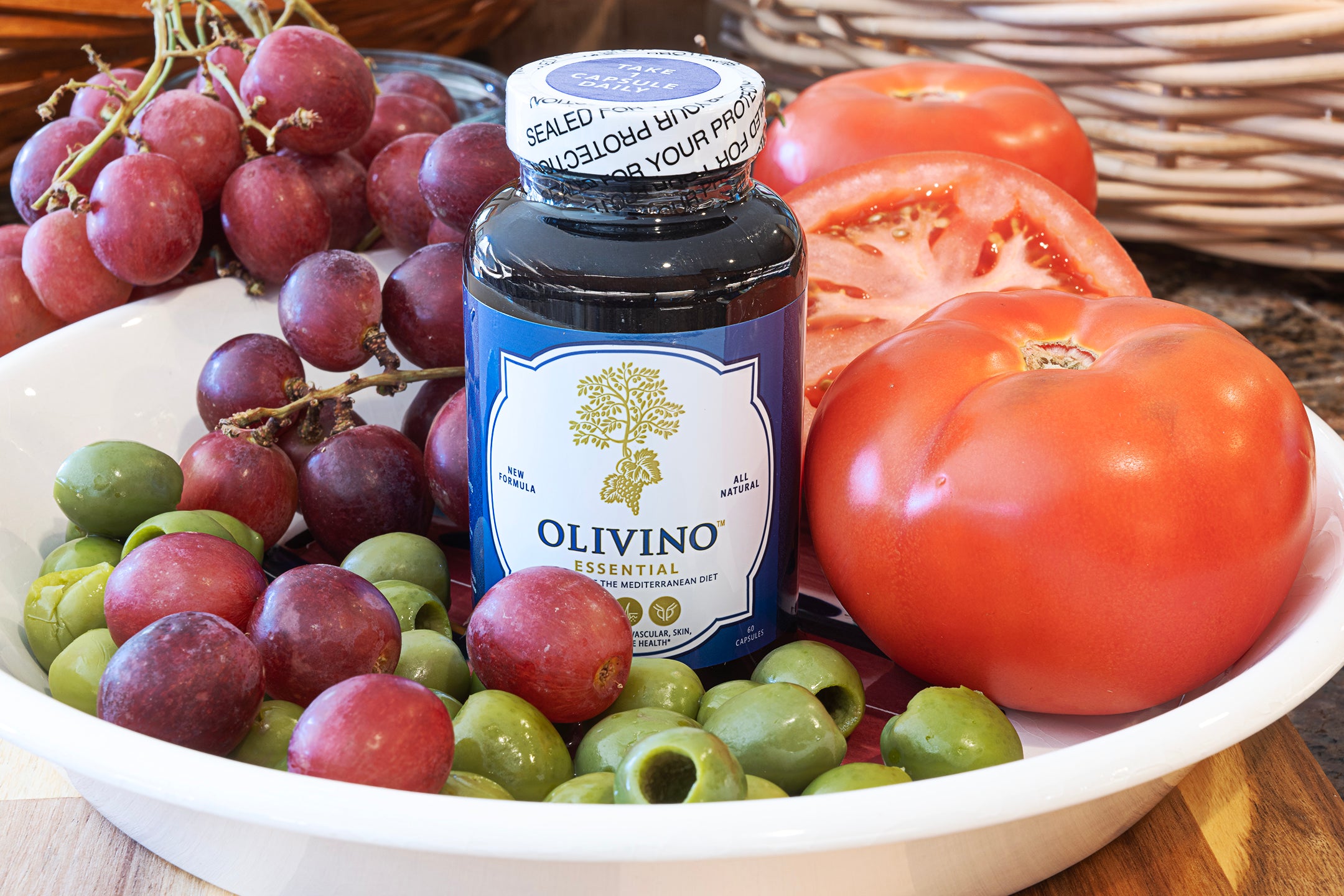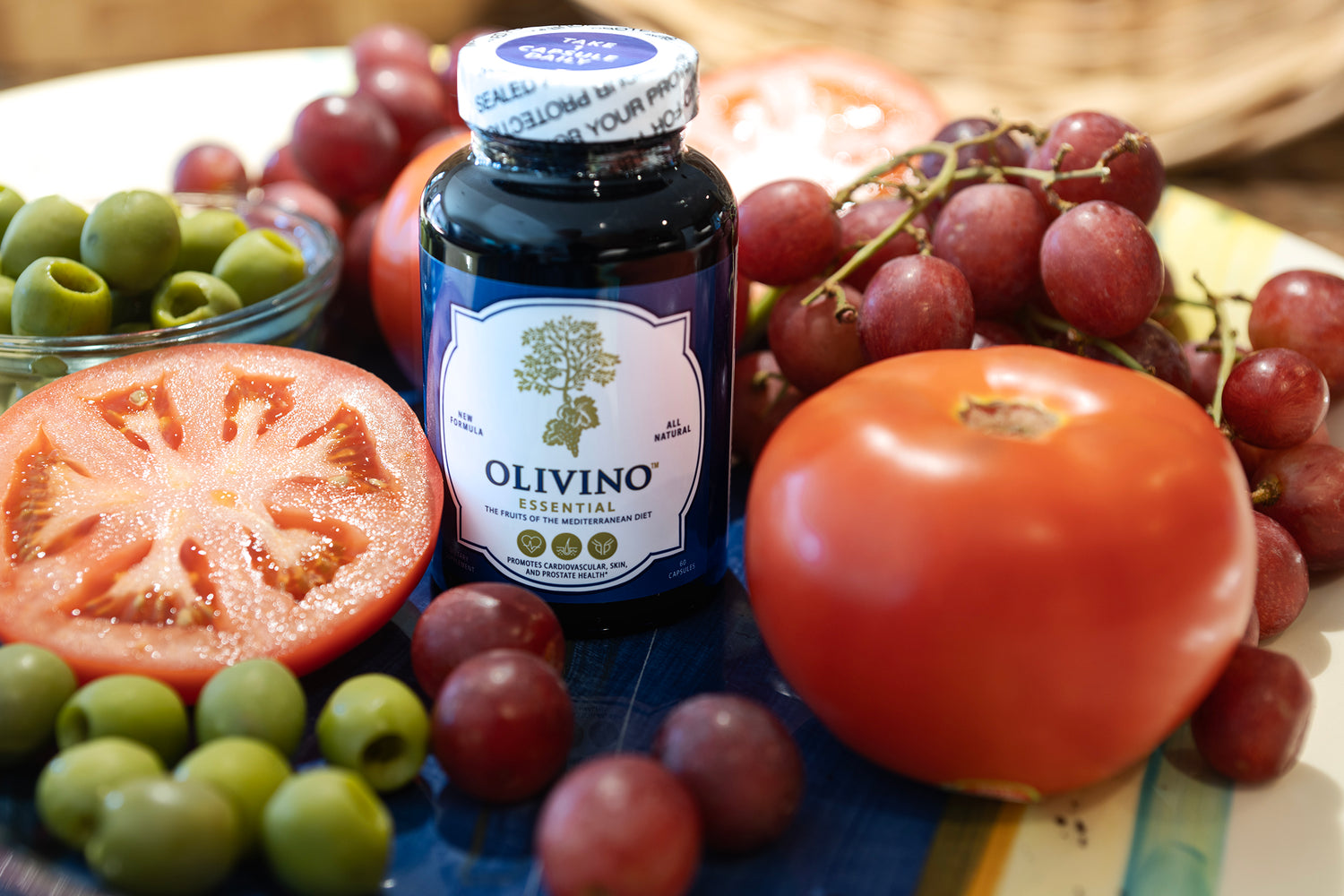The Science Behind OlivinoLife

GRAPE SEED EXTRACT AND CARDIOVASCULAR HEALTH
The Effect of Grape (Vitis vinifera) Seed Extract Supplementation on Flow-Mediated Dilation, Blood Pressure, and Heart Rate: A Systematic Review and Meta-Analysis of Controlled Trials with Duration- and Dose-Response Analysis.
Foshati S, Nouripour F, Sadeghi E, Amani R. Pharmacological Research. Vol. 175 (2022): 1-15.
Read More Here
Key Findings: The objective of this systematic review and meta-analysis of 19 controlled trials was to assess the long-term effect of grape seed extract (GSE) supplementation on flow-mediated dilation (FMD), systolic blood pressure (SBP), diastolic blood pressure (DBP), and heart rate (HR) in adults. GSE supplementation significantly reduced DBP (−2.20 mmHg) and HR (−1.25 bpm) but had no significant effects on FMD or SBP. Researchers concluded that GSE may be beneficial for individuals with or at risk of cardiovascular disease because it may have hypotensive and HR-lowering properties.
The Effects of Grape Seed Extract on Glycemic Control, Serum Lipoproteins, Inflammation, and Body Weight: A Systematic Review and Meta-Analysis of Randomized Controlled Trials
Asbaghi O, Nazarian B, Reiner Z. Phytotherapy Research. Vol. 34 (2020): 239-253.
Read More Here
Key Findings: The aim of this review and meta-analysis of 15 studies (published through May 2019) was to analyze the effects of grape seed extract (GSE) on glycemic control, serum lipoproteins, inflammation and body weight. Supplementation with GSE resulted in a significant decrease in fasting plasma glucose, total cholesterol, low-density lipoprotein (LDL) cholesterol, triglycerides, and C-reactive protein (CRP) concentrations. GSE did not influence HbA1c or HDL cholesterol levels.
Effects of Grape Seed Proanthocyanidin Extract on Vascular Endothelial Function in Participants with Prehypertension: A Randomized, Double-Blind, Placebo-Controlled Study.
Odai T, Terauchi M, Kato K, et al. Nutrients. Vol. 11 (2019): 1-12.
Read More Here
Key Findings: This randomized, double-blind, placebo-controlled study investigated the effects of grape seed (GSE) on blood pressure (BP) and vascular endothelial function in middle-aged Japanese adults (6 men, 24 women) aged 40-64 with prehypertension. The participants were randomized to receive either low-dose (200 mg/day) or high-dose (400 mg/day) GSE, or placebo, for 12 weeks. Systolic and diastolic BP, brachial flow-mediated dilation (a measure of how well blood vessels expand and contract in response to changes in blood flow) and other cardiovascular parameters were measured. Average SBP in the 400 mg/day group significantly decreased by 13 mmHg after 12 weeks. Vascular elasticity also improved. GSE consumption helped maintain vascular elasticity and normal blood pressure in this population.
The Impact of Grape Seed Extract Treatment on Blood Pressure Changes. A Meta-Analysis of 16 Randomized Controlled Trials
Zhang H, Liu S, Li L et al. Medicine. Vol, 95 (2016): 1-7.
Key Findings: This meta-analysis reviewed data from 16 clinical trials involving 810 participants to see how grape seed extract (GSE) affects blood pressure (BP). Overall, GSE led to significant reductions in both systolic BP and diastolic BP. Even greater reductions were seen in those under 50 years old, obese individuals (those with a body mass index of 25 or higher), and people with metabolic syndrome. The study found that longer trials (lasting 8 weeks or more) showed more significant reductions in BP compared to shorter trials (less than 8 weeks). When looking at the dosage of grape seed extract, lower doses (less than 800mg per day) were more effective in reducing both systolic and diastolic BP than higher doses (800mg or more per day).
Effect of Grape Polyphenols on Blood Pressure: A Meta-Analysis of Randomized Controlled Trials
Li S-H, Zhao P, Tian H-B, et al. PLoS One. Vol. 10 (2015): 1-12.
Read More Here
Key Findings: This meta-analysis examined data from 10 different studies. Eight of these studies were double-blind. Some studies included healthy adults, while others included people with conditions like high blood pressure or heart disease. The number of participants in each study varied from 9 to 70, and their ages ranged from 31.4 to 63.7 years. The amount of grape polyphenols given to participants varied from 150 mg to 1400 mg per day, and the treatment duration ranged from 2 to 16 weeks. Results showed that daily grape polyphenol intake could significantly reduce systolic blood pressure by 1.48 mmHg compared to controls. Diastolic blood pressure was not significantly decreased in the grape polyphenols group as compared to controls.
The Effect of Grape Seed Extract on Cardiovascular Risk Markers: A Meta-Analysis of Randomized Controlled Trials.
Feringa, HHH, Laskey DA, Dickson JE, Coleman CI. Journal of the Academy of Nutrition and Dietetics. Vol. 111 (2011): 1173-81.
Read More Here
Key Findings: The objective of this systematic review was to assess the effect of grape seed extract (GSE) on changes in blood pressure (BP), heart rate, lipid levels, and C-reactive protein (CRP) levels in randomized, controlled clinical trials published through 2010. In nine (9) studies involving 390 participants, GSE significantly lowered systolic BP and heart rate. No significant effect on diastolic BP lipid levels, or CRP was found.

BENEFITS BACKED BY SCIENCE
- Promotes cardiovascular health
- Helps maintain healthy blood pressure
- Fights inflammation
- Protects against free radicals that can damage skin
- Helps maintain a healthy blood sugar level
- Promotes healthy prostate function


